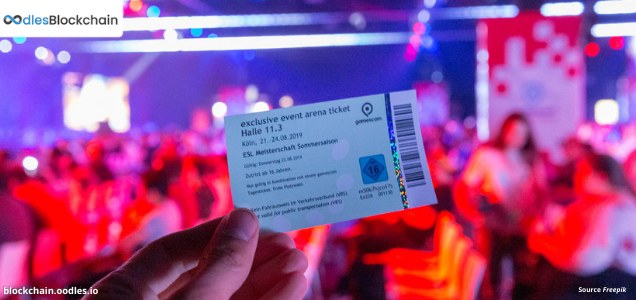-
Over the last decade, the introduction of digital ticketing has become a significant trend. Attendees can now buy tickets on their smartphones, save a copy of their ticket to their device pocket, and use it to gain access to the venue directly. Ticket sellers then communicate with their customers on a more intimate level and start cultivating long-term relationships. It has become a more convenient and beneficial method of ticketing. However, blockchain solutions can impact ticketing solutions and help the industry evolve in a more effective way.
Digitized Ticketing's Current Challenges
While digital ticketing (to some extent) eliminates paper inefficiencies such as fraud and convenience, there are still some digital stumbling blocks to overcome.
Unscrupulous resellers take screenshots or photocopies of tickets and resell them to unsuspecting victims several times.
Organizers lack power and access to secondary markets, which allows for inflated ticket resale.
Due to unregulated secondary markets, bad actors still gain access to events. Additionally, personal data is always at risk on centralized ticketing systems, which are vulnerable to attacks.
These challenges create opportunities for blockchain to make an innovative impact on ticketing solutions for those who value protection and accountability.
Why is Blockchain for Digital Ticketing Management Important?
By design, blockchain makes it simple for multiple parties to interact with one another without the need for a central authority – particularly when their levels of trust differ.
Therefore, it is necessary to build a thriving environment in which participants collaborate to solve a common problem.
Using blockchain-based permissioned networks for digital ticketing solutions will improve the ecosystem of ticketing and provide the following benefits.
Authentication
Blockchain networks use an immutable ledger to store information about ticket origins and safe transactions. Instant access to unalterable ticket data aids in the full elimination of forgeries.
Transparency is Essential
The use of blockchain systems allows you to monitor the entire process, from ticket release to ticket purchase.
It eventually makes communication between the parties involved more clear.
Automated Systems
The use of blockchain-based smart contracts allows event organizers to create transparent and automatically executable pricing, exchange, refund, resale, and benefit distribution laws.
Blockchain Applications in Digital Ticketing Management
Ticketing Protocol Standardization
Today, a ticketing protocol is primarily key to the structure of ticketing information.
However, it prevents customer data exchange or ticket tracking outside of a single ticket provider.
Blockchain tickets standardize protocol, giving stakeholders crucial control over the market.
Detailed Documentation
Awareness is truly a strength when it comes to blockchain-based ticketing management.
Event managers can recognize ticket holders, display all past sales, and see if a ticket has been resold and at what price by having access to the entire history of ticket transactions. It cuts down on both fraud and operating costs.
Also, Read | A Compact Guide to Business Blockchain App Development
Regulation of the Secondary Market
Governments all over the world are looking at the secondary ticket market.
The solution is to use blockchain tickets. Issuing tickets on the blockchain can enable controlled ticket resale and a fair pricing model. It also aids in the eradication of scalpers.
Ticket Flow Management
In event ticketing, blockchain creates an immutable chain of transactions that regulates ticket movement.
You'll know when it was resold, to whom, and at what price. As a result, you can verify and monitor the origin of a fare, providing a foundation for dispute resolution and enforcement.
Know Who Your True Customer Is
Blockchain ticketing technology allows for near-instantaneous identity verification, ensuring that you know who is attending your event.
As a result, event promoters will have a clear picture of who will be in attendance, as well as useful data analytics for potential marketing purposes.
Preventing Fraud
Historically, the secondary market consisted of street vendors who purchased cheap tickets outside of a venue and resold them to last-minute ticket buyers at a higher price.
Today's market is dominated by online ticketing platforms. You'll have complete control over your event tickets if you store them on a blockchain.
Also, Check | How NFT Ticketing Disrupts The Ticketing Industry
A Hypothetical Use-Case Scenario for Event Ticketing with Blockchain
Our experts at Oodles propose a conceptual model in which a common idea is used to construct blockchain-based event management and ticketing system.
An event planner can use an app to build and send an event to a website as well as a mobile wallet.
The event will include information such as an event's title, date, time, place, and a ticketing ordering button.
Then, a participant will order tickets after paying for Token X. X, the e-ticket will instantly go to the participant's mobile wallet.
To gain access to the event site, the organizer just needs to search for the participant's e-ticket.
We need to build a smart contract layer on top of the Ethereum blockchain network to improve the platform and automate the purchase and selling of event tickets.
Developers may use Solidity to create contracts. At least three smart contracts are required: the ERC20 token contract (to create Token X), the event contract, and the ERC721 ticket contract.
Most Viewed | A Quick Guide to Ethereum ERC Token Standards
Conclusion
Digital ticketing has progressed from being a straightforward traditional paper stub to becoming engaging for attendees and organizers.
Understandably, ticketing applications based on blockchain are just a scratch on the surface. Expect blockchain to push the envelope even further for digital ticketing in the coming years.
Using blockchain for event management systems has now passed the proof-of-concept stage.
They are gaining significant traction, making it more appealing for businesses to use the platform to solve their problems.
Connect with our skilled blockchain developers to find out how to get started with a blockchain-based ticketing management system.

Our Offices
INDIA
Emaar Digital Greens, Sector 61,
Gurugram, Haryana
122011.
Welldone Tech Park,
Sector 48, Sohna road,
Gurugram, Haryana
122018.














